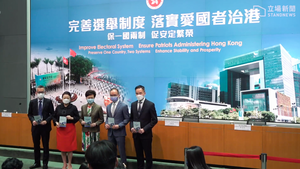
Back الإصلاح الانتخابي في هونغ كونغ 2021 Arabic Cambios a la Ley Electoral de Hong Kong de 2021 Spanish 2021年香港政治制度改革 Chinese 香港2021年政改方案 ZH-YUE

The 2021 Hong Kong electoral changes were initiated by the National People's Congress (NPC) on 11 March 2021 to "amend electoral rules and improve the electoral system" of the Hong Kong Special Administrative Region (HKSAR) for its Chief Executive (CE) and the Legislative Council (LegCo), in order to ensure a system in which only "patriots", according to the Chinese definition, govern Hong Kong. The reforms have been widely criticized for their negative impact on the democratic representation in the Hong Kong legislature.[1]
With the National People's Congress Standing Committee (NPCSC) amending the Annex I and Annex II of the Basic Law of Hong Kong, the compositions of the Election Committee (EC), which is responsible for electing the Chief Executive, and the Legislative Council were drastically revamped.[2] The size of the Election Committee would be increased from 1,200 to 1,500 seats with a sizeable number of new seats which would be nominated and elected by the government-appointed and Beijing-controlled organisations. The Legislative Council would be increased from 70 to 90 seats where the currently 35 seats which were directly elected would be shrunk to 20 seats, while an extra 40 seats would be elected by the Election Committee.[3] A new vetting mechanism would also be created to vet every candidate running for the Chief Executive, the Legislative Council and the Election Committee based on the approval of the Hong Kong Committee for Safeguarding National Security according to the review by the National Security Department of the Hong Kong Police Force (HKPF) whose decision would be final and could not be appealed.[4]
The electoral changes, which came after the passing of the Hong Kong national security law in June 2020 and the subsequent mass crackdown including arrests of opposition activists, were widely seen as a move to further curb the influence of the pro-democracy camp in the wake of the widespread anti-government protests of 2019 and the electoral landslide of the 2019 District Council election.[5]
- ^ Cite error: The named reference
france2420210311was invoked but never defined (see the help page). - ^ 王晨 (2021-03-05). "关于《全国人民代表大会关于完善香港特别行政区选举制度的决定(草案)》的说明". 新华社.
- ^ Tian, Yew Lun; Zaharia, Marius (11 March 2021). "China moves to overhaul Hong Kong politics, squeezing democratic opposition". Reuters.
- ^ Cite error: The named reference
bloomberg20210330was invoked but never defined (see the help page). - ^ Bradsher, Keith; Ramzy, Austin (4 March 2021). "Demanding Loyalty, China Moves to Overhaul Hong Kong Elections". The New York Times. Archived from the original on 9 July 2023.